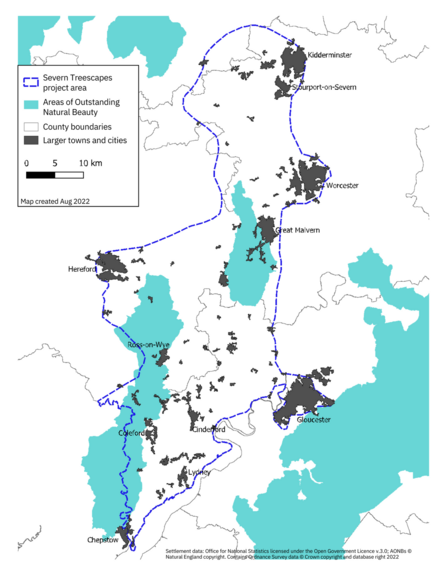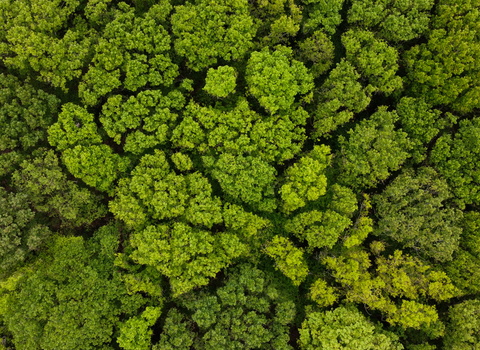Curious to find out more about where the trees are going or how you can get involved?
Read our frequently asked questions below.
What land does the project cover?

Severn Treescapes project area
What advice will be offered and to who?
Arrange a visit with a Severn Treescapes Tree and Woodland Advisor to discuss how you could incorporate more trees into your land to shade livestock, reduce soil erosion, provide buffers to watercourses, improve connectivity for wildlife or how to manage existing trees and woodland.
They can also offer suggestions for how to access funding for tree planting schemes including woodlands, hedgerows, wood pastures, parklands, tradition orchards and agroforestry or to deliver management and protection.
There are a range of schemes available for small and larger planting, including Rural Payments Agency (RPA) and non-RPA schemes.
They can also put you in touch with other relevant organisations who can advise on the other aspects such as wood products.
I’m a landowner – how can I get involved?
Contact Laurence, Richards, our Trees and Woodland Advisor on laurence@worcestershirewildlifetrust.org for information on:
- Available tree and woodland grant schemes including Countryside Stewardship, England Woodland Creation Offer, Severn Trent Commonwealth Games Legacy Forest Funding, Green Finance Initiatives and more
- Incorporating more trees into your farming system, for example through hedgerows, wood pastures, parklands, traditional orchards, agroforestry, shelter belts, small or larger woodland creation
- Woodlands that you would like to get a management grant for
- Planting or creating a new woodland
- To talk to someone about the potential that your land holds for incorporating more trees
How can communities get involved?
Community groups and schools might be interested to join in the seed to sapling initiative in Gloucestershire, where our colleagues will be running events to collect local native tree seeds. The groups can then grow them in pots in back gardens until local planting sites are available. Please contact megan.finn@gloucestershirewildlifetrust.co.uk if you're interested in getting involved.
How can parish and town councils get involved?
Parish and town councils may be looking for advice on planting community woodlands or orchards or just adding a few key trees to local greenspaces, while local communities could be interested in growing those trees to be planted in local locations.
The Severn Treescapes team can help to identify suitable planting sites, provide advice on tree planting grants and help the community to collect and grow native tree seed for local plantings - a great way to engage children with their community and develop an appreciation of and responsibility for their local environment.
For planting, management and grants advice, please contact Laurence Richards, our Trees and Woodland Advisor laurence@worcestershirewildlifetrust.org
For seed collection and events in Gloucestershire, please contact our Community Engagement Coordinator megan.finn@gloucestershirewildlifetrust.co.uk.
What if I live in or own land that isn’t in Gloucestershire or overlaps its boundary?
The project is working across three neighbouring counties. If you own land that isn't in Worcestershire or overlaps county boundaries, you can find more local information on the following websites:
Gloucestershire Wildlife Trust Herefordshire Wildlife Trust
Who are the project partners?
Our partners for this project are:
- Gloucestershire County Council
- Herefordshire Council
- Worcestershire County Council
- Severn Trent Water
- Environment Agency
- BBC Radio Gloucester Ourboretum
What are some native tree species that are suitable for growing?
Common beech, Fagus sylvatica
Blackthorn, Prunus spinosa
Bird cherry, Prunus padus
Wild cherry, Prunus avium
Field maple, Acer campestre
Hawthorn, Crataegus monogyna
Hazel, Corylus avellana
Hornbeam, Carpinus betulus
Large-leaved lime, Tilia platyphyllos
Small-leaved lime, Tilia cordata
Sessile oak, Quercus petraea
Common or English oak, Quercus robur
Rowan, Sorbus aucuparia
Spindle, Euonymus europaeus
Sweet chestnut, Castanea sativa
Common walnut, Juglans regia
Wild service tree, Sorbus torminalis
Whitebeam, Sorbus aria
This useful guide from the Woodland Trust will help you identify trees throughout the year.

